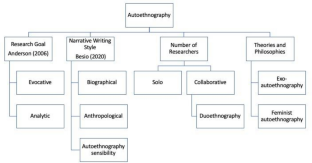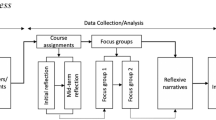Abstract
The aim of this paper was to explore the use of autoethnography methodology, a non-traditional and reflective approach, in educational technology research. Autoethnography involves a critical analysis of personal experiences and stories being positioned within the larger cultural, political, and social context. Following an overview of the origin and development of autoethnography as empirical research, the authors discuss autoethnography in the context of educational technology research by considering its epistemological and methodological issues. In this paper, the authors also consider autoethnography and its relationship to other qualitative research approaches. Essential components and summarized evaluation criteria for novice autoethnographers are shared. Lastly, the paper reflects on the potential benefits as well as the challenges that those writing an autoethnography will inevitably face. There is a need for autoethnography research in our field to reveal voices hidden in mainstream educational technology research.

Similar content being viewed by others
Data availability
Not applicable. This paper does not involve any data collection or analysis.
References
Adams, T. E., & Herrmann, A. F. (2020). Expanding our autoethnographic future. Journal of Autoethnography, 1(1), 1–8. https://doi.org/10.1525/joae.2020.1.1.1
Anderson, L. (2006). Analytic autoethnography. Journal of Contemporary Ethnography, 35(4), 373–395.
Anteliz, E. A., Mulligan, D. L., & Danaher, P. A. (2022). The Routledge international handbook of autoethnography in educational research. Routledge.
Atkinson, P. (1997). Narrative turn or blind alley? Qualitative Health Research, 7(3), 325–344.
Bannan-Ritland, B. (2003). The role of design in research: The integrative learning design framework. Educational Researcher, 32(1), 21–24.
Barab, S., & Squire, K. (2004). Design-based research: Putting a stake in the ground. The Journal of the Learning Sciences, 13(1), 1–14.
Belbase, S., Luitel, B. C., & Taylor, P. C. (2008). Autoethnography: A method of research and teaching for transformative education. Journal of Education and Research, 1(1), 86–95.
Besio, K. (2020). Autoethnography. In A. Kobayashi (Ed.), Encyclopedia of human geography (2nd ed.). Elsevier.
Bonk, C. J., & Wiley, D. A. (2020). Preface: Reflections on the waves of emerging learning technologies. Educational Technology Research & Development, 68(4), 1595–1612. https://doi.org/10.1007/s11423-020-09809-x
Boufoy-Bastick, B. (2004). Auto-interviewing, auto-ethnography and critical incident methodology for eliciting a self-conceptualised worldview. Forum Qualitative Sozialforschung/forum: Qualitative Social Research, 5(1), 651. https://doi.org/10.17169/fqs-5.1.651
Bowers, S., Chen, Y. L., Clifton, Y., Gamez, M., Hubbard Giffin, H., Stanley Johnson, M., Lohman, L., & Pastryk, L. (2022). Reflective design in action: A collaborative autoethnography of faculty learning design. TechTrends, 66(1), 17–28. https://doi.org/10.1007/s11528-021-00679-5
Bradshaw, A. C. (2017). Critical pedagogy and educational technology. In A. D. Benson, R. Joseph, & J. L. Moore (Eds.), Culture, learning and technology: Research and practice (pp. 8–27). Routledge.
Buch, E., & Staller, K. (2014). What is feminist ethnography? In S. N. Hesse-Biber (Ed.), Feminist research practice: A primer (pp. 107–144). Sage Publications.
Campbell, E. (2017). “Apparently being a self-obsessed c**t is now academically lauded”: Experiencing Twitter trolling of autoethnographers. Forum Qualitative Sozialforschung/forum: Qualitative Social Research, 18(3), 2819. https://doi.org/10.17169/fqs-18.3.2819
Chang, Y. K., & Kuwata, J. (2020). Learning experience design: Challenges for novice designers. In M. Schmidt, A. A. Tawfik, I., Jahnke, Y. Earnshaw (Eds.), Learner and user experience research: An introduction for the field of learning design & technology. EdTech Books. https://edtechbooks.org/ux
Cilesiz, S. (2011). A phenomenological approach to experiences with technology: Current state, promise, and future directions for research. Educational Technology Research & Development, 59(4), 487–510. https://doi.org/10.1007/s11423-010-9173-2
Cooper, G. (2023). Examining science education in ChatGPT: An exploratory study of generative artificial intelligence. Journal of Science Education and Technology, 32(3), 444–452. https://doi.org/10.1007/s10956-023-10039-y
Denejkina, A. (2017). Exo-autoethnography: An introduction. Forum Qualitative Sozialforschung/forum: Qualitative Social Research, 18(3), 2754. https://doi.org/10.17169/fqs-18.3.2754
Donaldson, A. J. (Ed.). (2016). Women's voices in the field of educational technology. Springer Cham. https://doi.org/10.1007/978-3-319-33452-3
Ellingson, L., & Ellis, C. (2008). Autoethnography as constructionist project. In J. A. Holstein & J. F. Gubrium (Eds.), Handbook of constructionist research (pp. 445–465). Guilford.
Ellis, C. (1999). Heartful autoethnography. Qualitative Health Research, 9(5), 669–683. https://doi.org/10.1177/104973299129122153
Ellis, C. (2004). The ethnographic I: A methodological novel about autoethnography. AltaMira Press.
Ellis, C., Adams, T. E., & Bochner, A. P. (2011). Autoethnography: An overview. Forum Qualitative Sozialforschung/forum: Qualitative Social Research, 12(1), 1589. https://doi.org/10.17169/fqs-12.1.1589
Ellis, C., & Bochner, A. P. (2006). Analyzing analytic autoethnography: An autopsy. Journal of Contemporary Ethnography, 35(4), 429–449.
Feenberg, A. (2005). Critical theory of technology: An overview. Tailoring Biotechnologies, 1(1), 47–64.
Fiock, H., Meech, S., Yang, M., Long, Y., Farmer, T., Hilliard, N., Koehler, A. A., & Cheng, Z. (2022). Instructional design learners make sense of theory: A collaborative autoethnography. Educational Technology Research and Development, 70(1), 1–27.
Hains-Wesson, R., & Tytler, R. (2015). A perspective on supporting STEM academics with blended learning at an Australian university. Issues in Educational Research, 25(4), 460–479.
Helsel, S. (1992). Virtual reality and education. Educational Technology, 32(5), 38–42.
Herman, K., & Clark-Stallkamp, R. (2022). Indulgent or Engaged? A Duoethnographic excerpt of personally disruptive epiphanies. TechTrends, 66(2), 122–124. https://doi.org/10.1007/s11528-022-00701-4
Herron, J., & Wolfe, K. A. (2021). University innovation hubs & technology-enhanced learning in K12 environments. TechTrends, 65(3), 320–330. https://doi.org/10.1007/s11528-020-00575-4
Hoadley, C., & Campos, F. C. (2022). Design-based research: What it is and why it matters to studying online learning. Educational Psychologist, 57(3), 207–220.
Hughes, S. A., & Pennington, J. L. (2017). Autoethnography: Process, product, and possibility for critical social research. Sage Publications.
Hughes, S. A., Pennington, J. L., & Makris, S. (2012). Translating autoethnography across the AERA standards: Toward understanding autoethnographic scholarship as empirical research. Educational Researcher, 41(6), 209–219.
Jonassen, D. H. (1984). The mediation of experience and educational technology: A philosophical analysis. Educational Communications and Technology Journal, 32(3), 153–167.
Jung, I., Omori, S., Dawson, W. P., Yamaguchi, T., & Lee, S. J. (2021). Faculty as reflective practitioners in emergency online teaching: An autoethnography. International Journal of Educational Technology in Higher Education, 18(1), 1–17.
Kimmons, R. (2020). Current trends (and missing links) in educational technology research and practice. TechTrends, 64(6), 803–809. https://doi.org/10.1007/s11528-020-00549-6
Lee, K. V. (2007). Confessing takes courage. Forum Qualitative Sozialforschung/forum: Qualitative Social Research, 8(1), 212. https://doi.org/10.17169/fqs-8.1.212
Lee, K. (2020). Autoethnography as an authentic learning activity in online doctoral education: An integrated approach to authentic learning. TechTrends, 64(4), 570–580. https://doi.org/10.1007/s11528-020-00508-1
Makwembere, S., Matarirano, O., & Jere, N. R. (2021). Lecturer autoethnographies of adjusting to online student interactions during COVID-19. Research in Social Sciences and Technology, 6(2), 148–168. https://doi.org/10.46303/ressat.2021.16
Mao, J. (2022). Policies governing educational technology: An international synopsis. In M. A. Peters & R. Heraud (Eds.), Encyclopedia of educational innovation. Springer. https://doi.org/10.1007/978-981-13-2262-4_252-1
Mao, J., & Yuen, A. H. K. (2018). Smart phones and wearable technologies in educational research. [Paper presentation]. The 2018 Hong Kong HKAECT International Conference. Hong Kong, China.
McDonald, J. K., Stefaniak, J., & Rich, P. J. (2022). Expecting the unexpected: A collaborative autoethnography of instructors’ experiences teaching advanced instructional design. TechTrends, 66(1), 90–110. https://doi.org/10.1007/s11528-021-00677-7
McKenney, S. E., & Reeves, T. C. (2019). Conducting educational design research (2nd ed.). Routledge.
Misawa, M. (2014). Autoethnography as a way to foster critical thinking skills for academicians in adult and higher education: A queer (Asian) crit perspective and example. [Paper presentation]. In Adult Education Research Conference 55th Annual Conference. https://newprairiepress.org/aerc/2014/papers/52
Muncey, T. (2010). Creating autoethnographies. Sage Publications.
Obenchain, K. M., Pennington, J. L., & Bardem, M. (2019). Intersecting goals in an elementary social studies design project: Confessional tales of teacher and researcher relationships. In B. C. Rubin, E. B. Freedman, & J. Kim (Eds.), Design research in social studies education (pp. 157–178). Routledge.
Patton, M. Q. (2002). Qualitative research & evaluation methods (3rd ed.). Sage Publications.
Pavlik, J. V. (2023). Collaborating with ChatGPT: Considering the implications of generative artificial intelligence for journalism and media education. Journalism & Mass Communication Educator, 78(1). https://doi.org/10.1177/10776958221149577
Poulos, C. N. (2021). Essentials of autoethnography. American Psychological Association.
Reeves, T. C., & Lin, L. (2020). The research we have is not the research we need. Educational Technology Research & Development, 68(4), 1991–2001. https://doi.org/10.1007/s11423-020-09811-3
Reeves, T. C., & Oh, E. G. (2017). The goals and methods of educational technology research over a quarter century (1989–2014). Educational Technology Research & Development, 65(2), 325–339.
Reeves, T. C., & Reeves, P. M. (2015). Reorienting educational technology research from things to problems. Learning: Research and Practice, 1(1), 91–93.
Ren, X. (2022). Autoethnographic research to explore instructional design practices for distance teaching and learning in a cross-cultural context. TechTrends, 66(1), 47–55. https://doi.org/10.1007/s11528-021-00683-9
Richardson, L. (2000). Writing as a method of inquiry. In N. K. Denzin & Y. S. Lincoln (Eds.), Handbook of qualitative research (2nd ed., pp. 923–948). Sage Publications.
Rogers-Shaw, C. (2021). Joining the evocative and the analytical: A new format for multivocal sociocultural qualitative research. [Paper presentation]. In American Association for Adult and Continuing Education 2020 Conference. https://eric.ed.gov/?id=ED611614
Romero-Hall, E. (2020). Research methods in learning design and technology: A historical perspective of the last 40 years. In E. Romero-Hall (Ed.), Research methods in learning design and technology (pp. 1–10). Routledge.
Romero-Hall, E. (2022). Navigating the instructional design field as an Afro-Latinx woman: A feminist autoethnography. TechTrends, 66(1), 39–46.
Romero-Hall, E., Aldemir, T., Colorado-Resa, J., Dickson-Deane, C., Watson, G., & Sadaf, A. (2018). Undisclosed stories of instructional design female scholars in academia. Women’s Studies International Forum, 71, 19–28. https://doi.org/10.1016/j.wsif.2018.09.004
Savin-Baden, M., & Major, C. H. (2013). Qualitative research: The essential guide to theory and practice. Routledge.
Schmidt, M., Tawfik, A. A., Jahnke, I., Earnshaw, Y. (Eds.). (2020). Learner and user experience research: An introduction for the field of learning design & technology. EdTech Books. https://edtechbooks.org/ux
Schwandt, T. A. (2015). The SAGE dictionary of qualitative inquiry (4th ed.). Sage Publications.
Seo, J. (2019). Is the maker movement inclusive of anyone? Three accessibility considerations to invite blind makers to the making world. TechTrends, 63(5), 514–520. https://doi.org/10.1007/s11528-019-00377-3
Sparkes, A. C. (2000). Autoethnography and narratives of self: Reflections on criteria in action. Sociology of Sport Journal, 17(1), 21–43.
Stahlke Wall, S. (2016). Toward a moderate autoethnography. International Journal of Qualitative Methods, 15(1), 1–9. https://doi.org/10.1177/1609406916674966
Stefaniak, J. E. (2020). Ethnographic consideration within instructional design research practices. In E. Romero-Hall (Ed.), Research methods in learning design and technology. Routledge.
Stefaniak, J. E., & McDonald, J. K. (2022). Introduction to the special issue on ethnographic experiences in learning design. TechTrends, 66(1), 2–3. https://doi.org/10.1007/s11528-021-00691-9
Stephens Griffin, N. D., & Griffin, N. C. (2019). A millennial methodology? Autoethnographic research in do-it-yourself (DIY) punk and activist communities. Forum Qualitative Social Research, 20(3), 3206. https://doi.org/10.17169/fqs-20.3.3206
Voithofer, R. (2005). Designing new media education research: The materiality of data, representation, and dissemination. Educational Researcher, 34(9), 3–14. https://doi.org/10.3102/0013189X034009003
Walster, D. (2017). Information policy and social media: Accept or decline. TechTrends, 61(3), 301–307. https://doi.org/10.1007/s11528-017-0179-z
Author information
Authors and Affiliations
Corresponding author
Ethics declarations
Conflict of interest
The authors declare that they have no potential conflict of interest.
Research involving human participants and/or animals
Not applicable.
Informed consent
Not applicable.
Additional information
Publisher's Note
Springer Nature remains neutral with regard to jurisdictional claims in published maps and institutional affiliations.
Rights and permissions
Springer Nature or its licensor (e.g. a society or other partner) holds exclusive rights to this article under a publishing agreement with the author(s) or other rightsholder(s); author self-archiving of the accepted manuscript version of this article is solely governed by the terms of such publishing agreement and applicable law.
About this article
Cite this article
Mao, J., Romero-Hall, E. & Reeves, T.C. Autoethnography as a research method for educational technology: a reflective discourse. Education Tech Research Dev (2023). https://doi.org/10.1007/s11423-023-10281-6
Accepted:
Published:
DOI: https://doi.org/10.1007/s11423-023-10281-6




